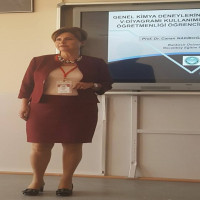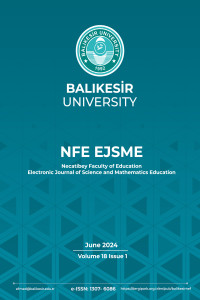Research Article
Issue Editorial Board





Erdoğan Özdemir is a physics education researcher at Sivas Cumhuriyet University. He develops innovative teaching tools and investigates the role of these tools in physics teaching.


Aim & Scope
Necatibey Faculty of Education, Electronic Journal of Science and Mathematics Education is an international online, refereed science and mathematics education journal that is published at least two issues in a year. NFE-EJSME is firmly established as the authoritative voice in the world of science and mathematics education. It bridges the gap between research and practice, providing information, ideas and opinion. It serves as a medium for the publication of definitive research findings. Special emphasis is placed on applicable research relevant to educational practice, guided by educational realities in systems, schools, colleges and universities.The journal comprises peer-reviewed general articles, papers on innovations and developments, research reports. All research articles in this journal have undergone rigorous peer review, based on initial editor screening and anonymized refereeing by at least two anonymous referees. NEF-EFMED is an open-access journal which means all content freely available without any charge. We support the rights of users to "read, download, copy, distribute, print, search, or link to the full texts of these articles".
Necatibey Faculty of Education, Electronic Journal of Science and Mathematics Education publishes scientific articles about the following topics.
- Mathematics Education
- Physics Education
- Chemistry Education
- Science Education
- Biology Education
- Educational Technology
Author Guidelines
- The language of our journal is English. Apart from the full English text, a Turkish abstract is required. When preparing your manuscript, please use and follow our template. The necessary writing rules are given in this template and some rules are summarized below:
- Manuscript Template
Before submitting the article, please check that the information of the Author(s) Name, Surname, Title, University, and Address have been removed from the main text of the manuscript. The "Title Page" document containing the article title, author(s), name-surname, and institution information should be uploaded to the system..
The abstract should be written max. 200 words. In addition, the abstract should not be contented with explaining the purpose of the study, should have a good command of the subject and should be written in a way that emphasizes the important points of the article (method, findings, and results). In the article, Turkish keywords should be included in the continuation (bottom part) of the Turkish abstract (Özet).
The main sections of the article should be listed as Introduction, Method, Results, Conclusions, Discussion and Suggestions, References, and Appendices (if any) without giving numbers.
Note: Articles should be written according to the journal template, but APA (American Psychological Association) 7 spelling rules should be taken into account for some writing rules such as citing and citing references in the text in general.
Ethical Principles and Publication Policy
The publication processes of the Necatibey Faculty of Education Journal of Electronic Science and Mathematics Education are based on the unbiased production, development and sharing of knowledge using scientific methods.
Reviewed articles are studies that ensure the application of the scientific method and impartiality. In the realization of scientific production, all components of the publication process; publishers, editors, authors, reviewers and readers must comply with ethical principles.
Ethical Responsibilities of Authors
Author(s) submitting a study to NEF EFMED are expected to comply with the following ethical responsibilities:
- The author (s) are expected to ensure that the submitted study is original and up-to-date. The author(s) are required to fully and accurately cite and/or quote all the studies they have used.
- Individuals who do not contribute to the content of the study should not be listed as authors. Situations and relationships that may constitute a conflict of interest (if any) should be disclosed.
- The author(s) may be requested to provide raw data on their manuscripts as part of the evaluation process. The author(s) should submit the requested data and information to the editorial and/or scientific board.
- The author(s) should inform the editor or publisher of the journal if he/she notices a mistake or error in his/her published work under review, and to cooperate with the editor in correcting or withdrawing his/her work.
- Authors cannot have their study in the application process of more than one journal at the same time.
- A study that published in another journal cannot be submitted to NEF EFMED.
- A study submitted to another journal that has not yet been evaluated cannot be submitted to NEF EFMED.
- No action such as adding or removing authors or changing the order of authors can be requested for a study whose evaluation process has started.
Ethical Duties and Responsibilities of Editors
The editors have the following roles and responsibilities
- Ensuring the development of the journal in the national and international arena,
- Managing processes to improve the quality of published studies,
- Implementation of the code of ethics for all shareholders of the journal,
- Updating publishing and ethical policies to contribute to the development of the journal,
- Organizing and keeping the web page of the journal up to date.
Relationships with the Readers
Editors must consider readers’ feedback towards publishing, scope and ethics of the journal. They must improve the studies published in the PUJE in consideration of the interests and needs of readers. In addition, they must be liable to respond to the questions of readers in line with ethical rules.
Relationships with Authors
The editors are responsible to the Authors for the following issues;
- Deciding with the field editors whether to send the manuscripts submitted to the journal to the reviewers or not,
- Informing authors about publication and ethical policies,
- Avoiding potential conflicts between authors and reviewers,
- Ensuring that the "Double-Blind Review" process is carried out in a healthy way,
- To consider requests from authors that they have a conflict of interest and that their manuscripts should not be sent to these reviewers, with appropriate justification,
- Evaluating authors' objections to reviewer and editor decisions/reports and initiating a new evaluation process if deemed appropriate.
Relationships with Reviewers
The editors are responsible to the Reviewers for the following issues;
- Identifying a reviewer appropriate to the subject of the study,
- Providing the information and guidance that reviewers will need during the evaluation phase,
- Monitoring for conflicts of interest between authors and reviewers,
- Keeping information about the reviewer confidential,
- Encouraging referees to be unbiased,
- Answering reviewers' questions about publication and ethical policies,
- Making updates to improve the referee pool,
- Reminding the referees about the evaluation period,
- Encouraging reviewers to review in a constructive, courteous and appropriate manner
Relations with the Editorial Board
The editors are responsible to the Editorial Board for the following issues;
- Meeting with the Editorial Board at regular intervals,
- Providing the Board with the information and guidance they will need regarding NEF EFMED's publication and ethical policies,
- Providing training to the board on NEF EFMED's publication and ethical policies when needed,
- Developing the journal by taking into account the feedback from the Board,
- Ensuring that Board members are impartial,
- Encouraging the Board to evaluate the studies within the framework of scientific criteria,
- Contacting the relevant board member about the evaluation according to the subject of the study.
Author Rights:
Author(s) can,
- Identify the referees to whom they do not want their work to be sent due to conflict of interest and/or ethical reasons.
- Withdraw their unpublished manuscripts while they are in the evaluation process.
- Oppose to reviewer reports and editor decisions
- Request corrections (erratum) for the problematic parts of their work in the first issue to be published due to material errors that occur during the printing process or for information errors caused by them.
Ethical Responsibilities of Referees
Studies submitted to NEF EFMED are sent anonymously to at least two reviewers in the relevant field for evaluation. In case of equality of positive and negative opinions, the opinion of the editor or a third referee is taken. NEF EFMED adopts a double-blind peer-review process, and the author and reviewer are unaware of each other's identity. In this context, reviewers evaluating manuscripts in NEF EFMED are expected to have the following ethical responsibilities:
- Reading the publication guidelines of NEF EFMED
- Accepting to evaluate only studies related to their field of specialization. Not accepting the evaluation only to have an idea about the subject of the study, even though it is not their field of specialization,
- Refusing to evaluate when they realize that they cannot be unbiased in doing so,
- Completing the evaluation process within a specific time frame,
- Making assessments with impartiality and confidentiality
- When faced with a conflict of interest, refuse to review and notify the editor,
- Notifying the editor when they detect that the article they are evaluating has been submitted to another journal at the same time,
- Use constructive and polite language in the evaluation. No personal comments such as hostility, insults and slander,
- To make sure that the evaluations are related to the content of the article. To be sensitive to the fact that factors such as faith, sect, race, gender, and political thought should never affect the evaluation process.
Price Policy
No article publication fee is requested.







